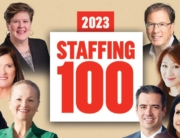California truckers continue to fight the state’s AB 5 legislation that makes classifying workers as independent contractors more difficult. Meanwhile, the US Department of Labor and Internal Revenue Service have renewed their partnership to fight misclassification.
New injunctions sought against AB 5. The Owner-Operator Independent Drivers Association and the California Trucking Association each have filed renewed preliminary injunction requests against the state of California’s AB 5 independent contractor law with the US District Court for the Southern District of California.
The CTA first filed the case in 2019, saying the legislation is preempted by the supremacy and commerce clauses in the US Constitution and is in direct conflict with the Federal Motor Carrier Safety Act and the Federal Aviation Administration Authorization Act of 1994. The case ultimately reached the US Supreme Court and was declined.
In its new request filed Jan. 11, the CTA claimed that the state “never articulated how a motor carrier can possibly satisfy” the law, particularly the “B” prong of the now codified ABC test for independent contractor status, which requires that a worker perform work outside the usual course of the hiring company’s business.
DOL and IRS renew partnership. The US Department of Labor and the Internal Revenue Service in December renewed a memorandum of understanding and added a streamlined process for joint referrals and closer coordination to stop businesses from misclassifying workers and denying them their full wages, benefits and protections under the law.
The updated MOU will help the department’s Wage and Hour Division share information and work with the IRS to strengthen the enforcement of federal and state laws that protect workers’ rights.
The Wage and Hour Division and the IRS previously signed an MOU in 2011 to enable both agencies to use their resources to promote employer compliance with obligations to pay employees and related employment taxes.
Canada extends work permits
Canada is extending work permits to family members of temporary foreign workers, according to Sean Fraser, the minister of immigration, refugees and citizenship, and Randy Boissonnault, the minister of tourism and associate minister of finance.
As of January, through a temporary two-year measure, Canada has expanded the eligibility to work in Canada to spouses and working-age children for workers at all skill levels.
“Everywhere I go, employers across the country continue to identify a lack of workers as their biggest obstacle,” Fraser said. “[This action] will help employers find the workers they need to fill their labor gaps by expanding work permits to family members at all skill levels, resulting in family members of over 200,000 foreign workers being able to work in Canada.”
AI law enforcement postponed in NYC
New York City won’t start enforcing its law over automated employment decision tools until April 15. Initially, Local Law 144 was to take effect Jan. 1.
According to SIA’s “North America Legal Update Q4 2022,” the law will require:
- Any such tool must be subjected to an annual, independent “bias audit,” with a publicly available summary.
- Employers must provide each candidate (internal or external) with 10 business days’ notice prior to the use of the tool.
- The notice must list the “job qualifications and characteristics” used by the tool to make its assessment.
- The sources and types of data used by the tool as well as the applicable data retention policy must be made available publicly (or upon written request from the candidate).
- Candidates must be able to opt out and request an alternative selection process or accommodation.







